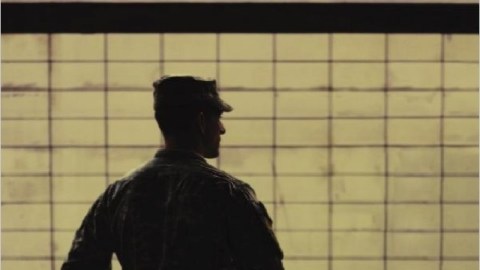Have We Finally Found the Voice of the American Soldier of the Iraqi and Afghan Wars?

After wars end and soldiers come home, it usually takes a while for the war to “come home” to the consciousness of the American people at large. When did the reality of Vietnam really enter the American imagination: in 1975, with the Fall of Saigon, or in 1978, with the film Coming Home? This detachment’s increased as a slimmer and slimmer slice of the demographic learns the lessons of combat life first, second, or even third hand. As veterans of the wars in Iraq and Afghanistan wars come home and try to find their place in America again, we still haven’t had that Coming Home moment artistically. Phil Klay’s Redeployment, a collection of twelve short stories by a former Marine who served in Iraq, may finally give the Iraq/Afghan vet a voice to be heard by the American imagination. With a brutally realistic eye yet a tender humanism fighting to survive, Klay’s fiction finally allows the American public to hear the voice of the veterans who don’t want or need your praise for their service, but rather long for your attention, understanding, and compassion.
Klay served during the “surge” as a U.S. Marines Public Affairs Officer in Iraq’s Anbar Province, the hotly contested section including Ramadi, Haditha, and the infamous Fallujah. After his discharge, Klay, a Dartmouth College graduate, pursued an MFA and later attended NYU’s Veterans Writing Workshop, a program created by NYU and Ambassador Jean Kennedy Smith to help Iraq and Afghanistan veterans learn to write about their experiences both as art and catharsis among their peers. “I couldn’t get away with certain types of BS that civilian readers would let me slide on,” Klay says of his time in the program. “Writing this book required a lot of conversations with a lot of people. I had to slowly learn how to write this book in order to write it.” What sets Klay’s writing apart from your typical war writing is this absence of the “certain types of BS” the public’s come to expect. As Klay points out, such a new set of expectations required a whole new way of writing, a literal learning on the job.
“We shot dogs.” With that first sentence of the first story, the titular “Redeployment,” you don’t know you’re reading a different kind of war fiction. At first sight, you might expect it to be followed with similarly Hemmingway-esque brusqueness and the accompanying machismo, but Klay sets you up for a quick fall and a whole new understanding of “grace under pressure.” The speaker (a veteran come home after seeing dogs eat dead bodies, thus forcing him and others to shoot them) describes how “it’s not a straight shot back, from the war to the Jacksonville mall,” and even darkly jokes how his wife’s “How are you?” really means “How was it? Are you crazy now?” By the time he recounts how a company officer slit the throat of a slowly dying insurgent and said, “It’s good to kill a man with a knife,” you’re shaking your head with the soldiers listening to him. Hemmingway bravado becomes Hemmingway burlesque—a mad carnival of killing and fear with no grace other than the humanity you manage to keep sheltered in your heart and mind.
The comparisons are obvious between Klay’s book and Tim O’Brien’s The Things They Carried, O’Brien’s collection of semi-autobiographical stories of his Vietnam War experiences finally published in 1990. Klay certainly couldn’t have even attempted his book without O’Brien’s groundbreaking work. But, whereas O’Brien spoke in a single, consistent voice, Klay inhabits a range of voices: soldiers in the midst of clearing houses, a corporal confessing to a kill a comrade won’t take credit for, Mortuary Affairs Marines collecting soldiers remains and themselves slowly becoming zombies from the experience, a middle management-level Foreign Services Officer desperately trying to deploy “money as a weapons system” to do some good for the locals, a chaplain struggling to save his own soul in those faithless surroundings. Klay’s ventriloquism, rendered with great, authentic detail thanks both to his personal experiences and face to face research with other vets, conveys a sense of the magnitude of the veteran experience while still maintaining the individuality of each voice. By the end, you hear both Klay and the everysoldier speak.
Whereas O’Brien described the Vietnam vet experience through memory expressed in language, Klay expresses the Iraq/Afghan vet experience through language expressed in memory. Better minds than mine will deconstruct the semiotics of Klay’s stories, but I continually came away impressed at how Klay demonstates how language can be a weapon both in the theater of war and in the theater of the war imagination. The Things They Carried leaves you conscious of the tricks of memory, while you carry away from Klay the tricks of language. Soldier lingo pervades the book, of course, but the short story “OIF” (for “Operation Iraqi Freedom”) inundates you with acronyms, eventually drowning you in a sea of alphabet soup to the point that language itself breaks down as a means of expressing what it was like to be there for those who weren’t. Similarly, a vet who specialized in “psychological operations” finds himself still manipulating minds while pursuing a degree on an American college campus among kids and even professors who look to him for some kind of war-won wisdom. “The only thing I felt I really had on these kids was the knowledge of just how nasty and awful humans are,” the speaker sadly admits, but only to himself. While writing about a war based on lies to the American public, Klay examines the lies the public tells itself about war as well as the lies vets allow themselves to tell and live because the alternative truth might be too much to handle for them and us. When a discharged vet turned lawyer writes a Medal of Honor citation as a favor for a friend in “Unless It’s a Sucking Chest Wound,” he interviews soldiers as research and finds that speaking with them “put[s] life into all the phrases I’d seen trotted out in all the awards I’d ever processed.” Klay puts life into the language of war and sucks you in with a compelling sense of the compassion between comrades as well as the never-ending desire to be simply understood rather than grandly honored.
Of all the memorable voices in Phil Klay’s Redeployment, the voice of the chaplain (“Chaps,” as the men call him) resounds the most in my memory. While delivering a tough sermon to an unreceptive audience of hardened combat soldiers consumed by their hate of the local Iraqis, who hate in return for the destruction of their homes and chaos of their lives, the Chaplain asks the soldiers to put themselves in the shoes of the insurgents: “Do not suffer alone. Offer suffering up to God, respect your fellow man, and perhaps the sheer awfulness of this place will become a little more tolerable.” That’s good advice for all vets as well as the American public struggling to embrace them back into the fold. Klay’s Redeployment hopes that we share the suffering of the Iraq/Afghan wars with one another and “redeploy” the negativity of physical and emotional pain into the positivity of community and belonging. “If you’re an American citizen, it’s your war,” Klay continually stresses in interviews. The American people may finally be willing to hear that truth and accept the people who bore that burden the greatest. Fortunately, Phil Klay may finally be the person we’ve been waiting for to speak that simple truth.
[Image: Detail from the cover of Phil Klay’s Redeployment.]
[Many thanks to The Penguin Press for providing me with a review copy of Phil Klay’s Redeployment.]




